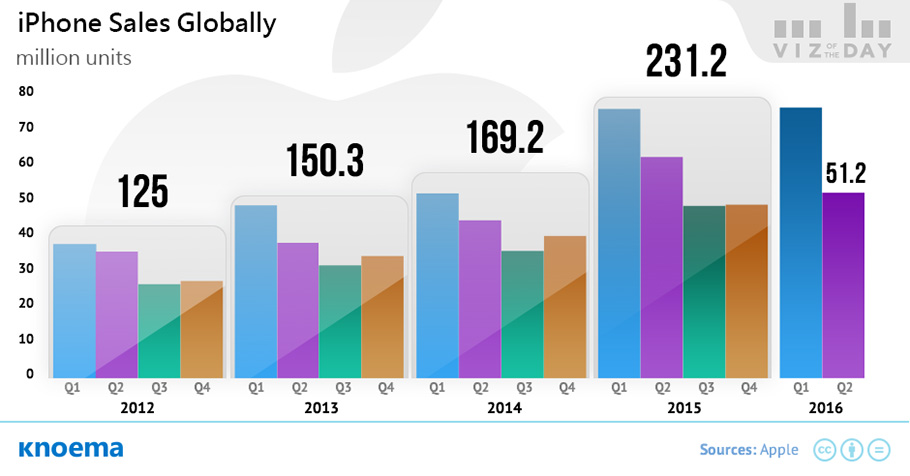During the second quarter of 2016, Apple sold 51.2 million iPhones worldwide. This is a decrease of 16.3 percent, or about 10 million units, compared to the same quarter in 2015. While all other major Apple products - iPhone, iPad, and iMac - likewise experienced negative year-on-year sales growth during the second quarter, the iPhone is uniquely critical to revenue growth for Apple, accounting for 78 percent of sales volume and 65 percent of sales value for the company.
The bad news did not end there for the global brand, with deteriorating performance in total revenue, most geographic segments, and select other products also emerging:
Total revenue. For the first time in 13 years, Apple’s total revenue declined in the second quarter compared to the same period one year ago and is expected to continue to decrease on a year-on-year basis in the third quarter to the range of $41-43 billion. Apple's CEO Tim Cook attributed the decline partly to the macroeconomic environment.
Sales worldwide. Concerning sales by operating segments, all segments except for Japan demonstrated year-on-year declines during the second quarter. In Japan, sales of Apple products increased by as much as 23 percent, however, the market accounts for the smallest share of Apple’s total sales. The Americas remains Apple’s largest market. The company's other operating segments - Greater China, Europe and rest of Asia Pacific - account for 12, 11, and 3 percent of revenue, respectively.
Other products. iPad sales have now trended down for two consecutive years. Sales of the iMac also started to decline for this first time since 2013.
Partly due to the popularity of iPhone, Apple remains the world's most valuable brand, according to the latest Forbes' brand report. With an estimated value of $154.1 billion, the Apple brand is more valuable than that of Google, Microsoft, Coca-Cola, and Facebook. The company’s optimism looking ahead to future quarters is founded in part on "the incredible strength of the Apple ecosystem,” according to CEO Cook, and further bolstered by strong revenue growth for Apple services and other products, such as AppleTV and AppleWatch. Moreover, Apple still remains the second largest smartphone vendor in the world after Samsung.
Материалы по теме
Number of Starbucks Stores Globally, 1992-2016
Today Starbucks is the largest coffeehouse company in the world, with 24,395 retail locations as of the first quarter of 2016, followed distantly by such coffee shop chains as Dunkin Donuts with about 10,000 restaurants, Tim Hortons with 4,300 outlets, and Costa Coffee with nearly 1,700 stores worldwide. Starbucks was founded in 1971 in Seattle, Washington, and incorporated on November 4, 1985 to become the publicly traded Starbucks Corporation. Based on the company's positive, sustained operating results, it is ranked among Forbes' top-500 world's biggest public companies. As of 2015, Starbucks' profit was $2.5 billion and it had a market...
Forbes 2016 World's Billionaires List
According to the 2016 Forbes World's Billionaires List, the total number of billionaires worldwide expanded to 1,810. The aggregate net worth of the list's members exceeded $6 trillion, while the average net worth was $3.6 billion. Source: Forbes World's Billionaires
Airline Industry | Airline Companies
Overview | Plane Crash Statistics | Air Passenger Market Analysis | Air Transport Traffic Data | Airline Companies | The European Aircraft Fleet
The Global Entrepreneurship Monitor
The Global Entrepreneurship Monitor is the largest ongoing study of entrepreneurial dynamics in the world. Initiated in 1999 as a partnership between London Business School and Babson College, the first study covered 10 countries; since then over 100 ‘National Teams’ from every corner of the globe have participated in the project, which continues to grow annually. GEM explores the role of entrepreneurship in national economic growth, unveiling detailed national features and characteristics associated with entrepreneurial activity. The data collected is ‘harmonized’ by a central team of experts, guaranteeing its quality and facilitating...
